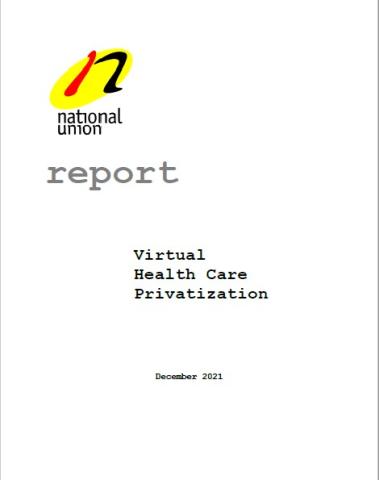NUPGE report warns against privatization through virtual health care
By Pat Van Horne, USW member of the CHC Board of Directors
Threats to Canada’s universal public health care system through creeping privatization are nothing new, but a recent report by the National Union of Public and General Employees (NUPGE) shows that the increase in ‘virtual’ health care during the pandemic is creating more private, for-profit delivery of health services.
While health care services provided by phone, video, email and secure messaging should make it easier for the public system to deliver health care, NUPGE’s research paper, “Virtual Health Care Privatization,” shows that the federal and provincial governments have allowed the private sector to deliver these services for profit and increasingly outside the control of the public system. NUPGE is a member of the Canadian Health Coalition.
“When the federal government provided $150-million for virtual health care, provincial and territorial governments were required to sign agreements governing how the money would be spent, but none of the agreements required that the money be spent in ways that respect principles in the Canada Health Act,” says the report.

“Virtual Health Care Privatization” published by NUPGE in December 2021. Read press release and report.
The result is that governments contract private companies to provide the technology and deliver services that were previously public, with many being allowed to fall under private insurance plans or fee for service.
“When many of the virtual clinics started operating (examples include Telehealth Ontario, operated by a subsidiary of a U.S.-based multinational called Sitel), most provinces did not cover virtual health care services,” says NUPGE. “That has changed since the start of the COVID-19 pandemic, with almost all provincial health care plans cover the cost of services provided by phone or video.
“However, any for-profit virtual clinic that continues to bill users directly, or through private insurance plans, appears to be at odds with the preamble of the Canada Health Act, which calls for ‘continued access to quality health care without financial or other barriers.’”
The corporate networks are vast, with many having links and partnerships with other companies, including those that provide medical record services, raising the spectre of privacy issues.
“In 2019, it was reported that a company dealing and supporting electronic medical records to primary care services in Ontario was selling the data to a U.S. corporation called IQVIA, which in turn was selling it to the pharmaceutical industry,” says the report.
Overbilling has also been revealed in audits, including cases where physicians had significantly high virtual-care billings. One had billings of $1.7-million in 2019/20, claiming to have seen 321 patients in a single day.
Overbilling has also been revealed in audits, including cases where physicians had significantly high virtual-care billings.
NUPGE concludes that virtual health care can and must be reviewed through a lens of public control to ensure that new technology is used to improve health care for all Canadians, without draining funds away from universal health care and into private corporations.
“Public control also makes it easier to put standards and monitoring in place to address privacy and security issues and to prevent abuses. It also encourages a more efficient use of resources by reducing duplication.”
At the same time, says NUPGE, fixing ongoing problems like the shortage of primary care providers is going to require more than a “new app”. It requires governments to provide greater support for public services and programs that can fill those gaps, such as non-profit community health centres.


